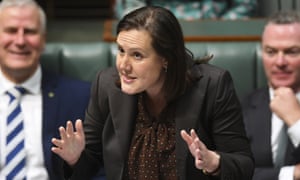Extract from The Guardian
Australian Jobs Minister Kelly O’Dwyer speaks during
House of Representatives Question Time at Parliament House in Canberra,
Wednesday, October 24, 2018. (AAP Image/Lukas Coch) NO ARCHIVING
Photograph: Lukas Coch/AAP
And yet it was Morrison’s minister for jobs and industrial relations, Kelly O’Dwyer, that established a new benchmark in Australian Industrial Unhingedness.
The character of O’Dwyer’s class preference was somewhat affirmed before the electorate in a notorious appearance on the ABC’s Q&A program in 2016. When asked a question about liveable income by a minimum-wage-earning parent with a disability struggling to provide for his kids, the then-assistant treasurer launched into a defence of tax cuts she insisted would – somehow – trickle-down into the economy via a local café’s purchase of a $6,000 toaster.
Responding to the union mobilisations this week, the former bank executive exceeded her own impressive standards of actions desperate, disconnected and tin-eared.
She launched an op-ed in Fairfax the day of the protests with warnings of anarchy, streets turned into battlegrounds and an evidence-free conspiracy theory that “unions will have been pressuring employees over recent days to engage in industrial action … for appropriate ‘high viz’ media exposure”.
There were no police incidents. Claims of “bullied” workers were somewhat undermined by relentless social media snaps of protestors in union colours marching to AC/DC cover bands, waving flags and having the time of their lives.
Undaunted, O’Dwyer attempted to demonise Victoria’s CFMEU leader, John Setka, for promoting the protests with the “vile slur” that “everything Hitler did in Germany was legal”. The source of Setka’s quote was the civil rights polemic “Letter from a Birmingham Jail”, yet “beyond repugnant” railed O’Dwyer.
In a bizarre interview on The Project, polite inquiry from Waleed Aly as to why if – as she claimed – unemployment was low, wages still weren’t rising, O’Dwyer praised her party’s tax cuts to small-and-medium businesses.
Such is the reward for those who “work hard” in the O’Dwyer and Morrison universe – the employers, whose work to maximise their extraordinary legal and economic advantage within the economy has, with the help of the Liberal and National parties, seen their wealth balloon. Those who do the hard work for them, now earning one seventy-eighth of what their CEO does, must apparently – the minister said – instead learn to manage their expectations.
For a party that supposedly identifies capitalism’s foundational economist, Adam Smith, as a “spiritual godfather”, I do wish the Liberals would absorb more of his observations as critique, and not instruction. “Masters are always and everywhere in a sort of tacit, but constant and uniform combination, not to raise the wages of labour” he writes in The Wealth of Nations in 1776. “As soon as the land of any country has all become private property, the landlords …” says Smith, “love to reap where they never sowed.”
The clamour for the magistrate – at best – and anti-union violence, at worst, has ever dogged the movement for industrial fairness.
This is the “history of all hitherto existing society” – to quote my own spiritual godfather – of course. O’Dwyer is at least right that there is a “battleground in the streets”, because there always has been one.
But the single comfort of our underpaid, unequal and exploited industrial present is that in our local theatre of the class war a panicking government has seized for the weapon of nonsense, because the union movement is wielding the weight of public opinion.
The Labor party may be the union movement’s political iteration, yet its politicians usually retain an instinct to avoid whatever is unpopular. It says everything about the effect of wage pressure on Australians that with state election barely a month away, Labor’s Victorian premier, Daniel Andrews, did not avoid Melbourne’s rally, but marched out the front of it in a proud display of majority sentiment. No wonder the Liberals are desperate.
• Van Badham is a Guardian Australia columnist and vice-president of MEAA Victoria
Scott Morrison condemns ‘cocky’ unionists and Kelly O’Dwyer warns of ‘dark days’ - all for workers demanding equal rights
Organisers
of the Australian union movement’s “Change The Rules” rallies this week
claimed the mobilisations numbered several hundred thousand protestors.
Even the unfriendly Herald-Sun was obliged to admit that the crowd
overspilling Melbourne’s streets on Tuesday was “up to 150,000” people in size.
These were no strikes, either, but explicitly “political protests”, which participants attended voluntarily, and at personal cost. Industrial strikes are no longer an automatic legal right in Australia, which is a key complaint of the union campaign.
Labor Senator Doug Cameron used Senate estimates on Wednesday to detail the attempts by the government-appointed Fair Work Ombudsman to enforce Australia’s unusually restrictive industrial laws to crush the rallies before they took place.
The Ombudsman’s office advised Australia’s employer groups on 10 October in writing that “workers joining the rallies could be breaking the law by withdrawing their labour or failing to attend work” and indicated their preparedness to “investigate any alleged breaches of the Fair Work Act”.
The letter “made no mention of employers’ obligation not to unreasonably refuse a worker’s request for leave to attend the rallies”.
But informing a culture of fairness is not, of course, the role of the Fair Work Commission under a Liberal-National government – if you don’t believe me, just ask someone who lost their weekend penalty rates.
It’s certainly not the priority of the federal government, whose naked enthusiasm to enforce the advantage of employers over the employed was provoked into feverish desperation by the union numbers this week.
Amid a low wage growth crisis – identified by no less than the Reserve Bank – it spoke not to material reality but an all-too-familiar ancient class loathing when Scott Morrison condemned protesting workers for exhibiting the “cockiness” to demand wage increases and an equalisation of rights.

These were no strikes, either, but explicitly “political protests”, which participants attended voluntarily, and at personal cost. Industrial strikes are no longer an automatic legal right in Australia, which is a key complaint of the union campaign.
Labor Senator Doug Cameron used Senate estimates on Wednesday to detail the attempts by the government-appointed Fair Work Ombudsman to enforce Australia’s unusually restrictive industrial laws to crush the rallies before they took place.
The Ombudsman’s office advised Australia’s employer groups on 10 October in writing that “workers joining the rallies could be breaking the law by withdrawing their labour or failing to attend work” and indicated their preparedness to “investigate any alleged breaches of the Fair Work Act”.
The letter “made no mention of employers’ obligation not to unreasonably refuse a worker’s request for leave to attend the rallies”.
But informing a culture of fairness is not, of course, the role of the Fair Work Commission under a Liberal-National government – if you don’t believe me, just ask someone who lost their weekend penalty rates.
It’s certainly not the priority of the federal government, whose naked enthusiasm to enforce the advantage of employers over the employed was provoked into feverish desperation by the union numbers this week.
Amid a low wage growth crisis – identified by no less than the Reserve Bank – it spoke not to material reality but an all-too-familiar ancient class loathing when Scott Morrison condemned protesting workers for exhibiting the “cockiness” to demand wage increases and an equalisation of rights.

And yet it was Morrison’s minister for jobs and industrial relations, Kelly O’Dwyer, that established a new benchmark in Australian Industrial Unhingedness.
The character of O’Dwyer’s class preference was somewhat affirmed before the electorate in a notorious appearance on the ABC’s Q&A program in 2016. When asked a question about liveable income by a minimum-wage-earning parent with a disability struggling to provide for his kids, the then-assistant treasurer launched into a defence of tax cuts she insisted would – somehow – trickle-down into the economy via a local café’s purchase of a $6,000 toaster.
Responding to the union mobilisations this week, the former bank executive exceeded her own impressive standards of actions desperate, disconnected and tin-eared.
She launched an op-ed in Fairfax the day of the protests with warnings of anarchy, streets turned into battlegrounds and an evidence-free conspiracy theory that “unions will have been pressuring employees over recent days to engage in industrial action … for appropriate ‘high viz’ media exposure”.
There were no police incidents. Claims of “bullied” workers were somewhat undermined by relentless social media snaps of protestors in union colours marching to AC/DC cover bands, waving flags and having the time of their lives.
Undaunted, O’Dwyer attempted to demonise Victoria’s CFMEU leader, John Setka, for promoting the protests with the “vile slur” that “everything Hitler did in Germany was legal”. The source of Setka’s quote was the civil rights polemic “Letter from a Birmingham Jail”, yet “beyond repugnant” railed O’Dwyer.
In a bizarre interview on The Project, polite inquiry from Waleed Aly as to why if – as she claimed – unemployment was low, wages still weren’t rising, O’Dwyer praised her party’s tax cuts to small-and-medium businesses.
Such is the reward for those who “work hard” in the O’Dwyer and Morrison universe – the employers, whose work to maximise their extraordinary legal and economic advantage within the economy has, with the help of the Liberal and National parties, seen their wealth balloon. Those who do the hard work for them, now earning one seventy-eighth of what their CEO does, must apparently – the minister said – instead learn to manage their expectations.
For a party that supposedly identifies capitalism’s foundational economist, Adam Smith, as a “spiritual godfather”, I do wish the Liberals would absorb more of his observations as critique, and not instruction. “Masters are always and everywhere in a sort of tacit, but constant and uniform combination, not to raise the wages of labour” he writes in The Wealth of Nations in 1776. “As soon as the land of any country has all become private property, the landlords …” says Smith, “love to reap where they never sowed.”
The clamour for the magistrate – at best – and anti-union violence, at worst, has ever dogged the movement for industrial fairness.
This is the “history of all hitherto existing society” – to quote my own spiritual godfather – of course. O’Dwyer is at least right that there is a “battleground in the streets”, because there always has been one.
But the single comfort of our underpaid, unequal and exploited industrial present is that in our local theatre of the class war a panicking government has seized for the weapon of nonsense, because the union movement is wielding the weight of public opinion.
The Labor party may be the union movement’s political iteration, yet its politicians usually retain an instinct to avoid whatever is unpopular. It says everything about the effect of wage pressure on Australians that with state election barely a month away, Labor’s Victorian premier, Daniel Andrews, did not avoid Melbourne’s rally, but marched out the front of it in a proud display of majority sentiment. No wonder the Liberals are desperate.
• Van Badham is a Guardian Australia columnist and vice-president of MEAA Victoria

No comments:
Post a Comment